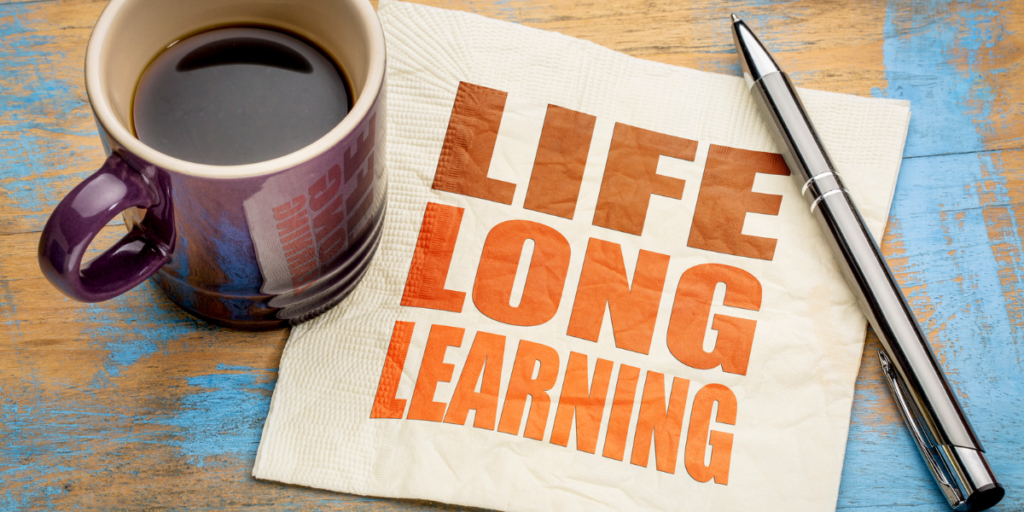Deaf Education and the importance of Lifelong Learning
The importance of lifelong learning is huge in my life. Being deaf, I miss out on a huge amount of information on a daily basis and I have always been self-driven to go out and find out more about my own interests and goals via methods that work for me.
I also work full time. That in itself presents many missed opportunities; for example in meetings and trainings, but mostly in everyday ‘informal learning’. This is mainly the everyday chat among colleagues; about work progress, issues, successes, even just a chat and a joke to build relationships. When my head is down, I’m focussed on my task at hand and I miss out on the social and professional growth opportunities which come with day to day chat and conversations around me. Informal learning is name for the learning you pick up in day to day life. And often it is mainly ‘auditory’.
Auditory Learning is One of Three Main Learning Styles:
- Auditory Learning: Auditory learners prefer to learn through hearing and listening. They process information best through lectures, discussions, audio recordings, and other auditory-based activities. They may also benefit from verbal instructions, music, and podcasts. Their power of recall is strongest here.
- Visual Learning: Visual learners prefer to learn through seeing and observing. They process information best through visual aids such as graphs, charts, diagrams, and videos. They may also benefit from reading, highlighting and from taking their own notes.
- Kinesthetic / Tactile Learning: Kinesthetic / tactile learners prefer to learn through hands-on experiences and physical activities. They process information best through touching, feeling, and doing. They may benefit from activities such as experiments, role-playing, and building models.
However, most people don’t only have one main learning style, but more likely a mixture of the above. I am mostly visual. I also enjoy tactile learning – activities where I can see, touch and create etc which again, all create stronger stamps in my memory. I do have a little auditory learning capability – when I am fully focussed, but my power of recall is greatly diminished by the concentration of capturing the next word, and the next.
Understanding your own deaf learning style can help you to identify the most effective learning strategies for you and improve your ability to acquire and retain information.
Learning is a lifelong journey. It doesn’t stop after school / college or a degree or diploma. There are constant new opportunities, skills, technology, experiences, fun to be had! My early educational experience could have been a lot better, I was the one who had to adapt to classes and learning. But whatever your experience has been in earlier education, in later life there is so much more you can do and get involved in!
What are the benefits to lifelong learning?
- Stay competitive in the workplace – jobs constantly evolve and new technologies and processes are being introduced all the time. If you don’t keep up with the latest trends and developments, you risk falling behind and becoming irrelevant in your field. By continuing to learn new skills, you can ensure that you remain competitive and in demand in the workplace.
- Open yourself up to new opportunities – Learning new skills can also present new opportunities that you may not have considered before. For example, if you’re interested in a particular industry or job role but don’t have the necessary skills, taking courses or training programs can help you acquire those skills and make a career change.
- Networking – As you dive deeper into your interests or hobbies, you will have opportunities to meet others in the same field and you can share knowledge, ideas and learn from one another. You can build relationships with mentors, friends and experts enabling you to broaden your own perspectives, learn from different viewpoints and keep up with trends and developments. See also: Deaf Networking.
- Enhance your personal growth and development – Learning new skills can also lead to personal growth and development. It can boost your confidence, improve your self esteem, and provide a sense of achievement. It can help you to expand your worldview, challenge your own assumptions, and develop your critical thinking skills.
- Access new experiences – Learning new skills can open a world of new experiences for you, in turn providing you with new perspectives, connections and ways to express yourself. Skills such as learning to travel independently or participate in outdoor activities can also enhance your personal growth, development and your personal sense of freedom.
- Improve your overall wellbeing – Learning new skills can also have a positive impact on your overall wellbeing. It can reduce stress, improve your brain function, and enhance creativity. Learning can also provide a sense of purpose and fulfilment, which can lead to increased happiness and satisfaction in life. All very important factors when it comes to deaf mental health!
We all have the capability to learn every day, and to teach. Your life and your deaf experiences are unique to you. Mental health is a big problem in the deaf community. We are statistically more likely to have poor mental health. However, learning and mental health are closely linked, with learning often having a positive impact. It can boost self-confidence and self-esteem and give you a greater sense of purpose and achievement. It doesn’t have to be anything particularly taxing, so long as it’s new to you. It can help you build resilience and also to develop a growth mindset, all of which can help when we face deaf challenges and set backs.
Meeting others while you’re learning is also hugely beneficial. You can share ideas, strategies, knowledge, difficulties, solutions and so much more! These connections can help you build relationships and offer / receive support. They can make learning be simply fun and enjoyable and provide you with a sense of community and belonging which again, can enhance your overall wellbeing. I have always developed strong relationships with others I have learned with and found their support to be invaluable. We are now in a world that is changing so fast in technology, that many of us can share lots of different ways we live with being deaf with different products and services tailored to our individual needs.
So, how about a new interest or hobby? Why not join our deaf community here and find out about the diverse interests we have. We’d love to hear about yours. Each of us have different dynamics. When you focus on your goals and interests, you can start to explore different learning opportunities. Ask yourself:
What do you hope to achieve by learning something new?
What topics or interests are you most passionate about?
What are your personal goals?
What are you professional goals?
What are the needs / gaps in your life that you could fill by learning something new?
What would be something you’d love to do for fun?
What experience would you like to achieve by learning something new?
Asking questions of yourself and to other people is an excellent way to start learning again. It might mean stepping out of your comfort zone, if you’re a bit shy or unsure, but that is an achievement in itself. Start building that deaf self confidence! I hope you’ll take a step forward and join our deaf club here to learn what we hope to achieve as a deaf network, together!





